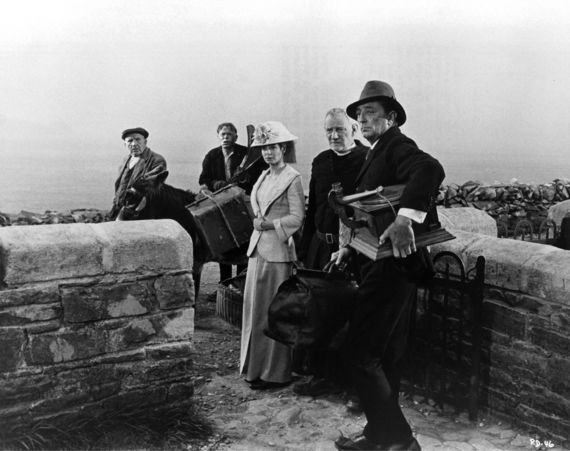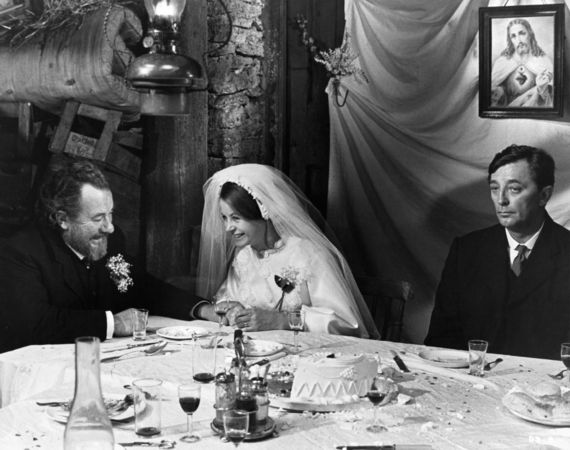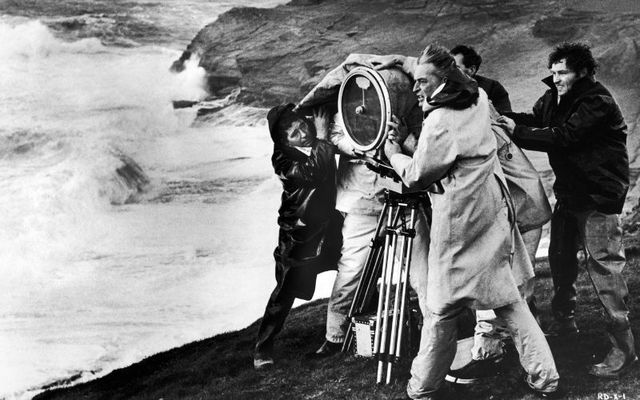The book "Making Ryans Daughter The Myths Madness and Mastery" sheds light on what really happened when Hollywood arrived in Dingle for the filming of the now-classic movie "Ryan’s Daughter"
When the Ryan's Daughter crew of 200 colonized the Dingle peninsula, the director David Lean took over the newly-built Skellig Hotel, which was largely empty during the winter months. Across town, the film's biggest star, Robert Mitchum had made his own arrangements, as Paul Benedict Rowan describes in his forthcoming book Making Ryan's Daughter.
If the Skellig was the official residence of "Ryan’s Daughter", then Milltown House was its disreputable, outrageous cousin – during Mitchum’s time – where all and sundry were drawn.
His personal assistant, Reva Frederick, had briefly come over from Los Angeles and picked out the small hotel across town from the Skellig, which Mitchum ended up renting out in its entirety from another family of Sheehys. Milltown House was more like a guesthouse, perched on the edge of Dingle Bay and accessible from the town across a narrow causeway. It would achieve almost instant notoriety once Mitchum took it over, becoming known as the ‘Dingle Brothel’, much to the horror of landlady Margaret Sheehy, but it was so much more than that. It was more like a drop-in center for locals who Mitchum had befriended, and an oasis for crew, actors and stand-ins.
Living with him was his ‘man’ when he filmed in Europe, an ex-British guardsman called Harold Sanderson, whose loosely defined role encompassed doorman, stand-in, drinks mixer, fixer and bodyguard. Mitchum regarded the hotel with a typically bemused air. ‘It had nine rooms numbered one to 10 – I never could figure that out. Upstairs, at one end of the hall, the sign said “Bath” and “T-I-L-E-T” at the other. It was $450 a month. Furnished it with a bunch of directors’ chairs.’
Mitchum had visitors, many of them over from England, where he had worked and played on numerous occasions, and he would inform folks on the set that ‘number 7 is hot tonight’ based on who was occupying that particular room at the time. He had other stories with which to amuse the crew. The telephone at the front desk of Milltown House remained in operation during Mitchum’s stay, and while he waited for Lean to call him to the set, he would end up talking to people on the telephone from places like Liverpool and Leeds.
Could they have their usual room, please? The family was coming.
Mitchum would respond: ‘You can have room 9.’ ‘We were in number 6 last time.’
‘Number 6 is occupied.’
‘What’s happened to Mrs Sheehy?’
‘Oh, she’s moved on. It’s run by a rich American now and he’s turned it into a nudist colony.’
This article was originally published in Ireland of the Welcomes magazine. Subscribe now!
Oiling the wheels of discourse were cases of whisky, brandy and other spirits delivered to the house by the drinks giant Seagram’s, whose owners the Bronfman family also had a stake in the film studio financing the movie, MGM. Mitchum put the socializing down to research, as he had come over a month before he was needed for his first scene to settle himself in and work on his Irish accent.
He did this by inviting locals around for drinks. Amongst his guests would be a senior member of the local Gardaí [police], the parish priest or the doctor. They would come in for a tipple and be there for four or five hours. The conversation would occasionally stray into politics or the wars in Biafra or Vietnam (Mitchum wasn’t long from a celebrity tour of duty in South East Asia), not to mention the growing tensions north of the Irish border, which the actor was following closely. Mitchum studied his history and liked it to be known that he wasn’t just a he-man; he was a highly literate he-man. While he was supposed to listen, he also ended up doing a lot of the talking, so his Irish guests had to adjust their ear to his hipster, jazzman talk.
Mitchum told them about his time working on the aircraft production line at Lockheed during the Second World War, when he became fast friends with a red-headed Irishman, Jim Dougherty, who used to share the lunch box prepared for him by his teenage wife, Norma Jean Baker, later to become Marilyn Monroe. Then there were his numerous run-ins with the law – ‘sassing the cops’ – which resulted in him doing time on a chain gang in Georgia after being busted for vagrancy during the Great Depression, when he rode freight trains around the US for years. Grass grew wild on the side of the line, and he later picked up another jail sentence for ‘conspiracy to possess’ marijuana, a famous Hollywood scandal that had forged his reputation.
Half the time his guests didn’t know whether the stories he told them were true or not, but they checked out, even if he liked to give them a twist. His guests were surprised by how well-read he was, and how he could quote at length from poems by Keats and Shelley.
When Mitchum and his wife Dorothy had the flu, he called the unit doctor and renowned storyteller, Donal Savage. The doctor arrived with a female companion and had a drink. After a couple of hours swapping yarns, Doctor Savage said: ‘You never did meet my wife, did you?’

A still from "Ryan's Daughter".
‘He then introduced Bob and me to his wife,’ says assistant director Michael Stevenson, who was also there that night. ‘Then he left without even offering any medicine. Bob says, “How about that shit? He drinks my Scotch. You never did meet my wife, did you?”’
Some of his guests left so shit-faced that Mitchum would watch to see whether they could make it over the narrow bridge across the Milltown River, which led from beside his hotel back into Dingle, without crashing their bicycle or car into the wall.
His living room was quickly stacked with magazines, books and records. On call once filming started, Mitchum settled down to read Christy Brown’s My Left Foot, after being introduced to the writer by a mutual friend, a solicitor named Joe Grace, who brought them all off on a pub crawl of Dingle. Crippled by cerebral palsy, Brown trusted Mitchum to wheel him around, as the actor had friends in wheelchairs who had returned badly injured from the fighting in Korea and Vietnam. Mitchum would later start an impromptu Christy Brown admiration society with the broadcaster David Frost. ‘In the heat we went out and had a few jars,’ he told Frost, putting on an Irish accent before getting serious.

Love Irish history? Share your favorite stories with other history buffs in the IrishCentral History Facebook group.
I have some friends who are paraplegics and have no use with their legs. And one of them is a big cat, 245 pounds, and I have to wheel him around in a wheelchair. And he is very delicate around the lower back, around the coccyx, because if he snaps again, then he’s really had it.
At the same time, you can’t be too delicate in a wheelchair because it is like balancing, like a furniture mover. Christy found out that I was at least acquainted with movement, with handling people in wheelchairs, so he felt confident. And we were both drunk, let’s face it, with all these Irishmen going from pub to pub.
Joe says [puts on heavy Irish accent], ‘Yer man Christy, he’s written a book.’ So I thought, what sort of book? Cat sitting there stoned, all twisted up. And I thought something by a child in crayon, as dim as I am. And it dawned on me that he was a very inquisitive and assimilative man.
When not filming during the day, which was most of the time, Mitchum developed a routine where he would go shopping around the town, which was a short walk from his lair. He would hop delicately from one store to the next with a wicker basket tucked under his arm, exchanging pleasantries with the shopkeepers and others, mostly getting goods on credit, and his wife Dorothy would then come around to pay the bills the next time she was in town.
While Lean poked around with the actors stuck on standby, Mitchum was determined to make his own life bearable. He figured that the time had come for the producers to come good on one of those promises that he could get away during a gap in his schedule. London, where he had many friends, beckoned, as did Los Angeles, while the spring rain fell on another soft day in Co. Kerry.

A still from "Ryan's Daughter".
‘He’d been on standby call for six weeks and I would go see him every night,’ says Stevenson. ‘Then one morning he drove his Porsche from Dingle to the set which took about thirty minutes. We were walking down the mountain together. I asked him, “Can I get you anything, Robert?” and he said, “I’m just going to grab a coffee.”
“The coffee’s this way, Robert.”
“Not where I’m going.”
‘He got in his car, drove to Shannon airport, got on a plane and went and had a coffee in LA.’
Mitchum was concerned about the youngest of his three children, Petrine, who was in her adolescence and completing her schooling, which meant Dorothy was only able to visit fitfully. He also wanted to see his two grown-up sons, Jim and Chris. Hardly had Mitchum raised the cup, or glass more likely, to his mouth at his home in Bel Air when the phone rang. ‘Don’t answer it,’ Chris said. ‘It’s them.’
However, Mitchum would answer the phone and then bitch about it. By Mitchum’s reckoning, he was still mid-flight when the decision was made to haul him back because of a change in schedule. At least he enjoyed recounting what had happened, putting on the plummiest of plummy English accents on a trip to London:
They said, ‘There’s no possibility of you being required for the next fortnight or possibly three weeks. You could go home, you know? As long as you are back within forty-eight hours’ notice.’ I’m like a trout at the bait. I flew off to Los Angeles and I could hear the phone ring at 39,000 feet. I landed. [Plummy English accent] ‘We’re awfully sorry about that.’
I came back to Ireland. Didn’t work for 23 days. Next time I went like a salmon for the fly. They said [plummy accent], ‘Why don’t you pop off somewhere more comfortable?’ I came over here and got to the Dorchester Hotel. The phone was ringing when I walked in. [Plummy accent] ‘Awfully sorry, Bob, but you are required.’
This article was originally published in Ireland of the Welcomes magazine. Subscribe now!
I flew back to Dublin, drove back down, didn’t work for twenty-one days. So after that I gave up, just spent more and more time sitting round the joint [Milltown House]. I had guests. My bar tab was about 11,000 bucks.
The drink would never run out, but Bob’s hospitality then entered a new phase as everybody tried to settle in for the long haul. Eateries were few and far between in Dingle; in fact, there were no restaurants besides the one in the Skellig and another in Benners Hotel, which was more downmarket. Ashe’s pub did an excellent Irish stew at lunch, but that service didn’t stretch into the evening. Tom Long or another publican, Paddy Bawn Brosnan, would throw a big pot of seafood on the counter of the bar as though it were a bowl of peanuts, and the crab claws would be ankle-deep on the floor by the end of the night, but it wasn’t exactly a four-course meal. Other than that, there was a takeaway chip shop that might or might not be open, depending on the whim of the owner.
Into the breach stepped the Hollywood tough guy, who, if you believed the rumors, was brawling down in the pubs of Dingle every night. Having sat by the phone every day at Milltown House or returned early from another wasted journey to his caravan, Mitchum would don his apron and start cooking up a storm, with members of the crew, excluding the top brass, invited.
‘The first time we met him he said, “How are you getting on for food? Kate [Ashe] looking after you? Come up to the house and I’ll cook you a meal”,’ says Bob Bremner. ‘We went up there. There he was. Bob Mitchum, big movie star, with an apron on, cooking a big spaghetti for the electricians. And maybe there might be a young lady there that he had brought in while his wife was away. He was a bit of a scallywag.’
Even when cooking, Mitchum couldn’t stop himself indulging in a bit of mischief. Not only did he make hash brownies, but hash burgers were a specialty too, and his sauces were often liberally sprinkled with the stuff. Many of his guests – grips, electricians, stand-ins, actors, good people of Dingle – had never heard, seen or tasted anything like it before.
One evening he held a special women’s event and sent out delightful invitations to ‘All the Esteemed and Venerable Ladies of Dingle to attend an evening of food and lively conversation’. Modesty didn’t prevent him playing the album he had recorded, Calypso – Is Like So..., on the massive stereo system he had at Milltown House to get the ladies moving a little bit. He also had another surprise when it came to the cooking.
‘I don’t like gravy of any description. When I was in Mitch’s house this one evening, Mitch was saying, “Have a bit, have a bit”,’ says the Irish actress Gladys Sheehan, employed as a ‘special extra’ on the film. ‘He had put cannabis or something in the gravy, and he had all these highly respectable women high by the end of the night and I was the only one who wasn’t.' He was a divil for doing that, but everybody loved him.’
He was, he would complain to anybody who would listen, ‘stuck on Devil’s Island’. When would it all end, he wondered?
* Taken from "Making Ryan’s Daughter: The Myths, Madness and Mastery" by Paul Benedict Rowan.
**Originally published in October 2022. Updated in May 2023.

Looking for Irish book recommendations or to meet with others who share your love for Irish literature? Join IrishCentral’s Book Club on Facebook and enjoy our book-loving community.




Comments